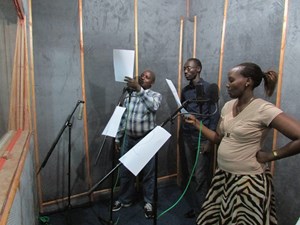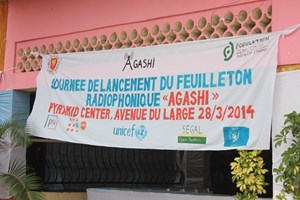Source: Population Media Center
Telephone Surveys in Burundi Enhance an Already Powerful Form of Behavior Change Communication
SHELBURNE, Vt., July 8, 2014 (GLOBE NEWSWIRE) -- Since January, people in Burundi have been listening to a new radio program called Agashi! ("Hey! Look Again!"). This 208-episode soap opera will air twice per week for two years, and uses Population Media Center's highly successful entertainment-education approach to behavior change.
Population Media Center (PMC) is a nonprofit organization that uses entertainment-education to address pressing social issues all over the world, impacting more than 50 countries over the past 16 years. All PMC soap operas are steeped in research:
- formative research to assess the policy and service framework within a country and to determine audience habits and perceptions in order to create realistic characters and settings;
- research around the greatest health, human rights, and environmental protection needs;
- clinic monitoring to assess impact of the PMC drama on new and existing clinic clients;
- listener letters, text messages, and calls to assess understanding and likability of characters and storylines;
- and endline data to determine the overall impact of a program.
But the PMC-Burundi office has developed a new form of audience research that's turning out to be tremendously useful to the drama's writing team: random telephone surveys. The responses from the telephone surveys are made available to the scriptwriters and producer within a matter of hours. Such quick turnaround of valuable information from listeners allows the creative team to make revisions to upcoming scripts. Respondents' telephone numbers are noted, along with any comments or suggestions they might have about the program, so that the creative team can phone back to get more in-depth feedback if necessary.
The idea for random telephone surveys was sparked by Jean Sacha Barikumutima, a PMC-Burundi intern who went over the pretest results of the first pilot episodes of Agashi. He realized that listeners provided a lot of ideas that could be useful to the creative team in the writing of the episodes.
"I realized that in a society with such a strong oral culture, a telephone survey had the potential to be a very powerful tool," Barikumutima says.
Barikumutima and Willy Nsengiyumya, the Finance Manager at PMC-Burundi, demonstrated that the telephone surveys were not only the simplest, but also the most cost-effective method for gathering listenership feedback. Barikumutima conducted the first survey in late January, and the results proved incredibly valuable to the creative team.
"This feedback helps the writers understand how people are reacting to the characters and the characters' decisions," says Kriss Barker, PMC's Vice President of International Programs. "They also provide ideas for positive and negative consequences that can be used in future episodes."
Barikumutima usually conducts the surveys on Thursday and Friday, sometimes continuing through the weekend. The PMC-Burundi creative team meets the following Monday to discuss the results. PMC-Burundi has conducted four random telephone surveys since launching the drama in January.
Although not statistically significant, the informal telephone surveys also give the PMC-Burundi team a sense of how many people are listening and the geographic distribution of those listeners. In January, about 38 percent of people surveyed said they listened to Agashi. In April, the percentage had risen to 68 percent and every comment noted the entertainment value of the program. One male Agashi listener said, "For me, Agashi is full of tips and entertainment. So I continue to follow it."
"This is such a fantastic, simple, and effective survey," says Stephanie Tholand, PMC's Program and Partnership Development Associate. "It's definitely a tool that every PMC country office will want to include in their program management going forward."
ABOUT POPULATION MEDIA CENTER (PMC):
Population Media Center (PMC) is a nonprofit, international nongovernmental organization, which strives to improve the health and well-being of people around the world through the use of entertainment-education strategies, like serialized dramas on radio and television, in which characters evolve into role models for the audience for positive behavior change. Founded in 1998, PMC has over 15 years of field experience using the Sabido methodology of behavior change communications, impacting more than 50 countries around the world. www.populationmedia.org
Photos accompanying this release are available at:

